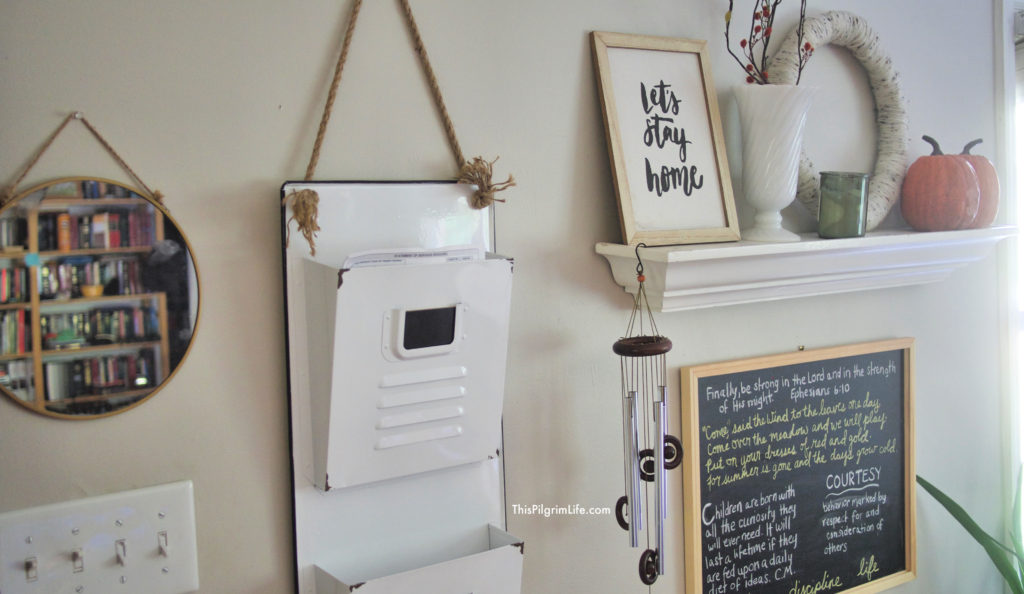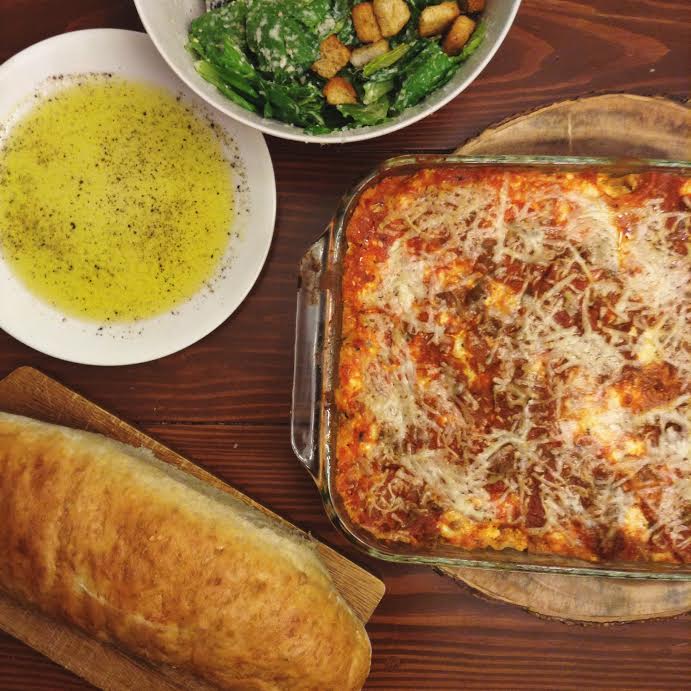Inviting people into our homes can be overwhelming and stressful, but it doesn’t have to be! Here are six easy tips for low stress hospitality, even with busy schedules and kids in the house.

The links below may be affiliate links, meaning I earn a small compensation at no extra cost to you. See my full disclosure policy here.
Do you have someone who regularly comes to clean your house? Taking care of not only the surface level cleaning, but really cleaning?
Do you hire out help for your cooking? Enjoying delicious food with no toil on your part?
Did an interior designer set up your home? Coordinating everything just so, with the effortless ease and seemingly limitless budget of Joanna Gaines?
If I had to guess, I would guess that for most of us, the answers to these questions would be a big no. If the house is cleaned, if food is prepared, if the couch pillows match the mantle decor, it is because someone in the family took care of it– usually with mama at the helm.
And yet this is the bar we set for ourselves before we feel that our home or food is adequate to share with others. Even before Pinterest, magazines like Better Homes and Gardens set us up with unrealistic expectations, and honestly, misaligned priorities.

Hospitality that Doesn’t Make You Pull Your Hair Out
If I could have a virtual megaphone and shout this from the rooftops, this is what I would say:
There is no bar set determining if your home is good enough.
There is simply this–
Do you have a table and the means to place food on it that you could share with others?
Do you have the ability to ask good questions and to listen to the answers?
Do you have enough self-forgetfulness to overlook the imperfections of the evening and share a laugh together when your kid wants to eat dinner dressed as Batman?
The key to being comfortable with these things is understanding the difference between entertaining others in our homes and practicing hospitality. And it starts before your first guest even arrives.
Entertaining others puts the focus on YOU. Your decor. Your food. Your graciousness. Your kids’ table manners. Practicing hospitality puts the focus on OTHERS. Relationship building. Serving food. Meeting needs. Them, them, them.

I shared on Intentional By Grace how we can fall into the snare of believing certain lies that can prevent us from enjoying the blessings of having people in our homes. If you have a hard time remembering the last time you invited a friend or family over to share a meal with you, perhaps it is because you are believing one of those lies. I would encourage you to check out that post.
If you are wanting to initiate more habits of hospitality in your home, but the thought still stresses you out a bit or you simply do not know where to begin, let me first say– YES! I would hug your neck if I could and tell you that taking risks in community, opening up both your hearts and your home, learning to invest in others over a meal (even take-out Chinese) around the table you sit at everyday will heap blessings on your whole family.
Over the years, we’ve learned several ways to keep practicing hospitality less stressful and more enjoyable for everyone.
Tips for Low-Stress Hospitality
1. Plan your week and your day so that everyone is set up for success.
While there are occasions when inviting others over for dinner is completely spontaneous, generally I like to make sure there is not a lot going on the day we will be having people over for a meal. This makes it more likely that neither the kids nor the adults will be fatigued and spent by the time guests arrive.
The same goes for looking at the week as a whole. Try to pick a night in which you will not feel overwhelmed in the midst of the rest of the week. After it’s all said and done, you want to look back on the time as a positive one, not the reason you were dragging and late and grumpy the next day.
If your weeks are already really busy, don’t use this as an excuse to wait for the perfect night. Just keep things as simple as possible and remember the priority is the people, not the details.
2. Include a “hospitality meal” in your meal plan and budget at the beginning of the week.
When I meal plan, I try to think of one meal each week that can easily be stretched to feed more than just our family. Knowing that I have food on hand and a meal in mind gives me the freedom to be generous with dinner invitations.
Typically, hospitality meals are ones in which the meat is not the star of the dish, simply because that gets expensive. Meals in which I can add beans, an additional side, or another filling component are great.
 Lasagna is best when made ahead of time!
Lasagna is best when made ahead of time!
Guests can bring a salad and a loaf of one-hour French bread makes the meal special and filling.
3. Choose food that can be easily prepared before everyone arrives.
I have learned this lesson over the years, much in thanks to my husband. Having the food mostly completed before guests arrive means that I am much more ready to graciously welcome them into our home, rather than rushing trying to finish and neglecting friends in hopes not to burn the food.
Let the food be cooking in the oven or Instant Pot, take a minute to load the dishwasher, and be ready to give all your attention to your guests.
4. Think beforehand about conversation topics and intentional questions to ask.
I know I’m not the only one who sometimes needs to check Facebook to remember my guests’ kids’ names. I’m sure my husband isn’t the only one who occasionally needs to be reminded of our guests’ names. This is always a good place to start.
When I asked a friend what she likes to do to make hospitality easier, she said that she and her husband like to spend a few minutes recalling what is going on in their friends’ lives and coming up with a few good questions to ask while they are there.
It’s not always necessary, but having these things in mind can really help to prevent awkwardness all around and can help to show that you really care about them individually.
5. Talk to your kids about your expectations before your guests arrive. Discuss ways to be a blessing while they are there.
If you want your kids to stay at the table until everyone is finished, make sure they know beforehand. If you expect them to answer when asked a question, remind them earlier in the day.
We try to encourage our kids to greet our guests when they arrive and thank them for coming when they leave. However, we don’t force the issue if they are feeling less than inclined. Doing so in front of guests can be weird for everyone involved. It’s a case in which practice over time makes better.
We also try to teach our kids to view the time as an opportunity to love and serve others. Brainstorm ways they can help and how they can help everyone feel comfortable. Then, as you see them do those things, be sure to encourage their efforts!
6. Accept help when it is offered.
Remembering that hospitality is not an opportunity to show off your skills makes it easier to accept help from your guests. You are all there to enjoying being together, and giving guests a task to do (like helping with the dishes) or asking them to bring a dish to contribute helps to set everyone at ease and feel at home.
Reserve a job or two that you can delegate if your guests ask to help when they arrive. Slicing the bread, making drinks, tossing the salad– each of these help avoid the awkward mingling that can happen before everyone sits down to the meal.

There is much more that could be said about hospitality and the richness that comes from inviting others to our home. I hope that you know this blessing in your life and that you are encouraged to welcome it more often, imperfect homes and burnt cookies and energetic children and all!
Sharing is caring! Don’t forget to pin and share. Thank you!

More posts you might enjoy:
Do You Believe These Common Lies About Hospitality?
An Easy Hospitality Meal for Every Eater
I Choose Comfortable– Escaping the Comparison Trap
Simple Meals for Hospitality that Will Make Having Company More Doable
Thank you for putting me on your email list. 🙂
You’re welcome! You were already on my newsletter list, but I had just taken a break from sending them out during the first part of my pregnancy! I’m hoping to be able to keep it up more regularly now. Thanks for expressing interest! 🙂
I was wondering. Thank you for letting me know. 🙂
Congratulations on your “surprise” pregnacy. My last son was not planned for my husband and I. Though I am so glad that God had Caleb planned for us!
I pray the rest of your pregnacy is a treasure and that your delivery is beautiful. I know the Lord will be with you and your newborn. 🙂
I’m going to have to spend some time reading your hospitality posts! I am always self conscious about the food I serve. I love being with people and enjoy the time when they’re actually here, but always feel stressed out before hand. I love your definition about entertaining vs. hospitality. I’m too focused on entertaining and not as focused on hospitality!
I echo Angela’s comment about needing to learn that having friends over for a meal is about hospitality not entertaining. Lisa, you stated that so well! That goes a long way. And I know this post will help me the next time we have a family over. Thank you!
I think this is awesome! I really like how you point out the key difference between entertaining and hospitality-so many times, I think that people forget that and get over-stressed about having others over! I think that #6 on this list is really important, and I’m glad that you mentioned it! I don’t know if men feel this way, but I know that for myself and many other women, we cannot function well at a gathering if we’re stuck in the awkward mingling phase. Doing simple tasks like putting plates on the table, putting appetizers on a platter, etc. are good ways to naturally let conversation happen and get the party mood going!